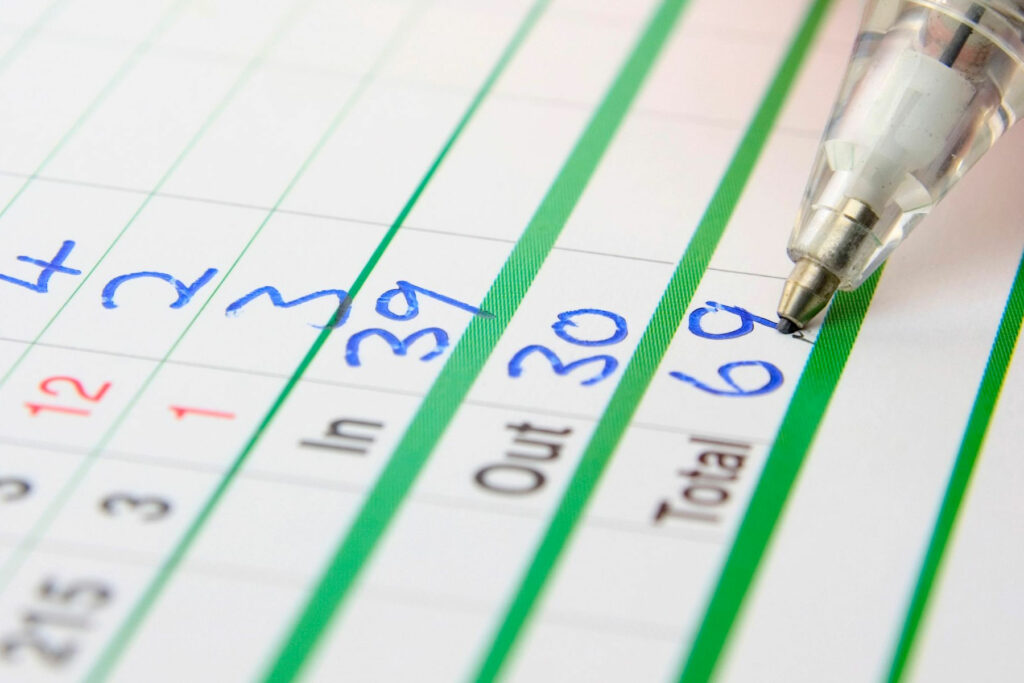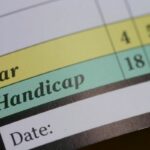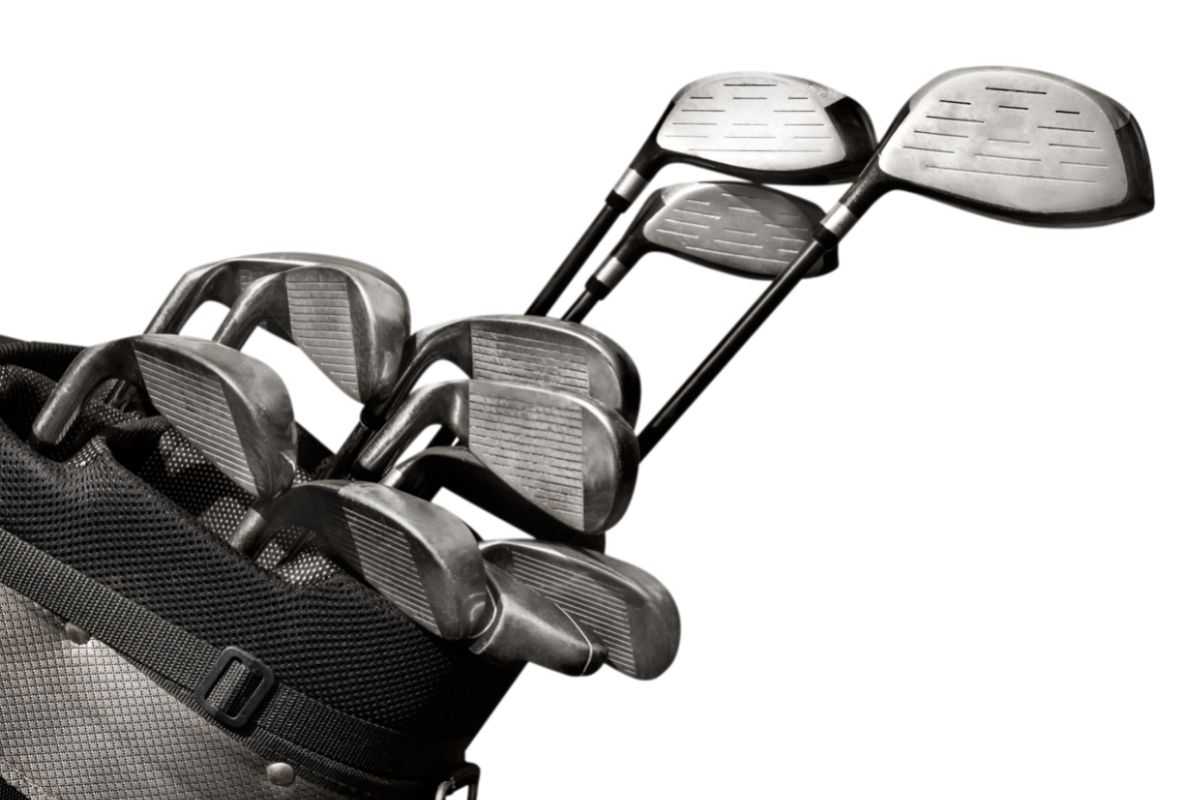We occasionally recommend products we love and might be paid a share of the sale.
Golf and gambling go together like peas and carrots. Thankfully there are many different golf betting games to choose from.
Many golf betting games allow players to “press the bet.” But what exactly does it mean to press the action in golf?
This article explains what the press is, how it can be used in different games, and some tips and strategies for when (and when not) to press.

What is a Press in Golf?
On a basic level, a press is the opening of a new bet during an existing round of golf and within an existing game. This new bet (the press) will run simultaneously with the original wager.
The press is a new bet on top of the first bet. It is most often for the same amount as the original bet and usually reserved for use by the team that is currently behind or trailing.
For example, James is playing Anne in a simple 9-hole stroke play game. James is down 5 shots after 8 holes and doesn’t have much chance of winning. He decides to press, which opens a new single hole match.
The new 1-hole match will be played concurrently with the original 9-hole match. If James beats Anne on this final hole, he will win the press while still losing on the first bet.
Here is an example scorecard demonstrating this situation:
| Hole | James | Anne | |||
| 1 | 5 | 4 | |||
| 2 | 5 | 4 | |||
| 3 | 4 | 3 | |||
| 4 | 3 | 3 | |||
| 5 | 5 | 4 | |||
| 6 | 4 | 3 | |||
| 7 | 4 | 4 | |||
| 8 | 5 | 5 | Press> | James | Anne |
| 9 | 3 | 4 | 3 | 4 | |
| Total | 38 | 34 | 3 | 4 | |
| Result | Lost | Won | Won | Lost |
*This is example is not common. Presses are usually reserved for match play formats or point games.
In this case, the two bets will cancel each other, and no money will be owed. You could consider this a type of double or nothing bet. Anne clearly out played James, but James used his press beautifully to finish the overall wager even with Anne.
Clarifying Betting Options Before Your Golf Round
As you can see, the press can swing a game quickly. It’s important to clarify the rules of the game before you start your round.
Golf betting games don’t have official rules. The specific parameters and regulations related to golf games often vary between different players, courses and locations. This is as true of the press as it is with any other golf betting game.
Golfers that love wildly swinging games will want the option to press more often. This is commonly referred to as an “unlimited press” game.
Most players prefer to limit the number of presses that are allowed for each player or team. This could mean one press for the entire round or one press on each side (one on the front nine and one on the back nine). It all depends on the game you’re playing and your group’s preferences.
Be careful how you negotiate these options. A simple $5 Nassau can become an expensive game if you allow unlimited presses, and the golfing gods turn against you.
Golf Games That Commonly Use Presses
Nassau is the most common golf betting game, and it is also most likely the game from where the press bet evolved. Since Nassau is already three games in one, the press fits perfectly in this format.
Opening a press on the front, back, or overall can keep a lopsided Nassau game interesting by giving the losing team something to play for when the initial bet is seemingly lost.
Almost any other game could incorporate a press option. Four-ball, Scotch, Las Vegas, High-Low, and countless other games work just fine when opening a secondary bet alongside the original wager.

Presses are almost always used in a match play format rather than a stroke play game (despite my example above).
Press For Success on the Golf Course
Timing is critical to a successful press. Knowing which holes are coming next and your opponent’s strengths or weakness will give you the best chance at winning the press.
If your opponent likes to hit a draw and the upcoming holes favor a fade, it might be a good time to press. Maybe you drive the ball much farther than your opponent, and the next few holes are especially long, giving you an advantage.
Perhaps the most important consideration is handicaps. Knowing which player will get strokes on the upcoming holes will greatly impact your decision to press.
For example, if you receive a stroke on the final hole and your opponent doesn’t, this is a great opportunity for you capitalize on a big advantage by pressing the that final hole.
Conclusions
The press is an important and common part of the golf gambling culture. It helps keep matches interesting and adds another layer of strategy to the competition.
That said, the press can also quickly escalate a small money game into a bunch bigger gamble. Be careful how you define the rules and when and where you use your presses.
However you decide to gamble (or not) on the golf course, make sure its adding to your enjoyment rather that subtracting. Remember, golf is supposed to be fun!
Frequently Asked Questions About Pressing
Who Is Allowed to Press?
A press can only be invoked by the player or team that is current losing the existing bet.
When Are You Allowed to Press?
Players can press anytime they are losing the current bet.
Many golfers add additional restrictions to the press. Some golfers require a player to be at least two holes behind before pressing the bet. Some players forbid the press on the final hole of a bet. Many golfers limit the total number of presses allowed during the round.
Can Golfers Refuse the Press?
In most cases, the press is mandatory when declared by the trailing player. However, some players give the leading player an option to refuse or accept the press. It’s best to clarify this before the game starts to avoid argument or ridicule.
How Do You Determine the Value of the Press Bet?
In almost all cases, the press bet is the same value as the original bet. As with all golf betting games, there is not official rule. Some players prefer the press to be half the original bet value and other golfers require the press to be double the value of the original bet.
- Funny Golf Terms - February 21, 2023
- How To Play Vegas Golf Game - February 16, 2023
- How To Play Wolf Golf Game - February 16, 2023








